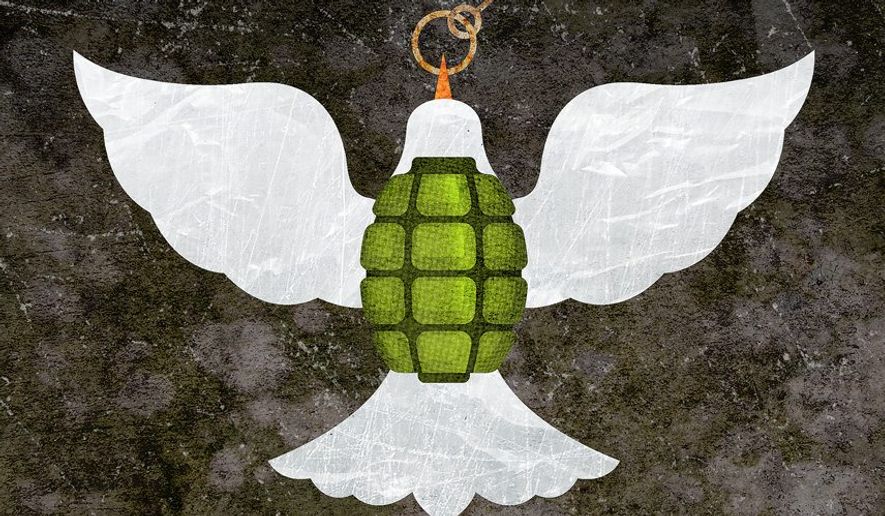OPINION:
Shortly after a peace agreement was signed between the United States and the Taliban that was supposed to lead to negotiations with the Afghan government, ISIS launched a horrific attack designed to remind everyone that the radical foreign jihadist movement is still alive in Afghanistan. How does an insurgent group such as the Taliban fight a counterinsurgency campaign?
We are likely to find out now that some manner of truce has been achieved in Afghanistan. ISIS has been operating in areas controlled by both the central government in Kabul and the Taliban. Both have claimed a degree of success in fighting this foreign-led group of insurgents, and eliminating ISIS presence is a condition of the U.S.-Taliban peace agreement. The Taliban may find that keeping their part of the bargain is harder than anticipated.
On paper, the Taliban should have an advantage over ISIS. Without the Americans hunting them from the skies, the Taliban should be able to move troops throughout the areas that they occupy much easier than before the truce in order to deal with ISIS strongholds. But the Taliban have several problems that will make it hard for them to conduct counterinsurgency operations. The first is money. Despite its recent setbacks, ISIS is still well-funded and has the capability to move money to isolated areas such as rural Afghanistan. Unfortunately, war has been a source of income for many otherwise unemployable young rural Afghan males who make up the core of traditional Taliban recruitment. As the war against the central government and its American partners winds down, unemployment will become an even bigger issue in “Talibanland.” ISIS has money, and money talks in Afghanistan.
If ISIS succeeds in recruiting former Taliban fighters in large numbers, an entirely different war will result. Tribal Afghan males like to fight, and they not particularly discriminating about the identity of the enemy. Any peace agreement between the Taliban and the Afghan government will likely have both sides governing the territory that they hold when the armistice goes into effect. The Taliban will quickly learn the hard truth of insurgency; it is a lot easier to be a rebel than to govern. Even in the areas that they have controlled for years, the Taliban have been able to cast themselves as a shadow government fighting against Kabul, which they claim has done its best to hinder progress and good governance. Suddenly, the Taliban will have no excuses for the mess that is rural Afghanistan. They are no more capable of delivering improved goods and services to the rural population than is the central government. ISIS — like all insurgents — will exploit this.
Although they claim that they are the opposite of the Kabul government in terms of corruption; once in power, local Taliban officials can be every bit as corrupt and incompetent as the worst officials that the central government sends out to administer the hinterlands. In the small district where I worked, our intercepts of communication with central Taliban leaders showed a high degree of dissatisfaction with the local shadow Taliban sub-governor’s ineptitude.
That does not mean that ISIS has clear advantages. A “hearts and minds” approach to governance is not one of their strengths. When it takes over an area, ISIS rules by terror and intimidation. Even if many ISIS fighters are recruited locally, the senior leadership remains foreign; this will tend to alienate the notoriously insular Afghans. Drugs are also a potential issue for ISIS. The Taliban successfully disrupted the poppy trade while they ruled the country, but were forced to embrace it as a funding source after the American intervention. ISIS remains on paper firmly anti-drug — along with anything else that smacks of fun — and poppies remain a source of valuable income for rural Afghan farmers in the areas where ISIS will vie for control with both the central government and Taliban.
Perhaps the greatest challenge for the Taliban — assuming that a truce with the central government holds — will be holding the loyalty of the burgeoning millennial and Generation Z populations. While some young guns will inevitably drift toward the adventure offered by ISIS, many others will be increasingly lured by the bright lights of the government-controlled big cities, leaving the Taliban to face a brain drain among the population of military-age males.
It would be a delicious irony if the Taliban — the champions of getting foreign influence out of Afghanistan — have to accept American military assistance against ISIS to keep their part of the peace deal.
• Gary Anderson lectures on Alternative Analysis at the George Washington University’s Elliott School of International Affairs. He served as a civilian adviser in Iraq and Afghanistan.




Please read our comment policy before commenting.